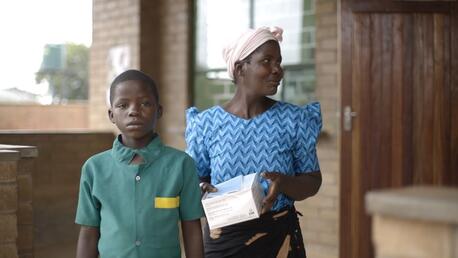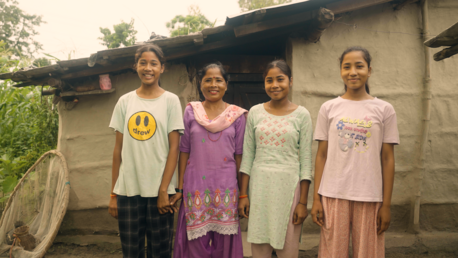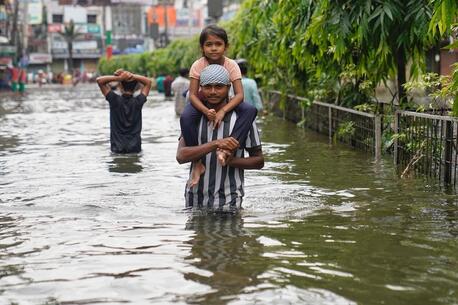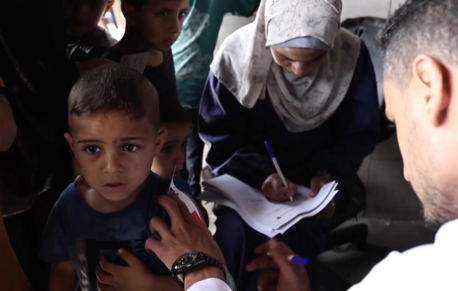
A Life Transformed by Noncommunicable Disease Screening
UNICEF works with governments, partners and donors to strengthen primary health systems and improve the detection and treatment of childhood NCDs.
Early detection and treatment provide better outcomes for children with noncommunicable diseases
Childhood noncommunicable diseases (NCDs) can rob children and adolescents of their right to health, nutrition, education and play. Children with NCDs require comprehensive health care, and UNICEF is working with governments, partners and donors to strengthen primary health systems to support these children.
Chifundo, a 10-year-old boy in Malawi, learned he had type 1 diabetes after months of suffering from weight loss, extreme thirst, frequent urination and fatigue. He was often so tired that his friends would carry him home from school.
Chifundo's family took him to Neno District Hospital, where he underwent mandatory NCD screening. He was diagnosed with type 1 diabetes, an autoimmune disease in which the body produces insufficient or no insulin, the hormone that regulates blood-sugar levels. Today, with proper care and twice-daily insulin injections, Chifundo is thriving at home and in school.
Nearly 1 million people under the age of 20 die every year from NCDs
The NCD screening facility at Neno is one of two hospital pilots conducted by the Ministry of Health and Partners in Health (PIH) and supported by UNICEF Malawi with funding from Eli Lilly and Company.
Each year, nearly 1 million people under the age of 20 die from NCDs including cancer, diabetes, high blood pressure and asthma. Though many of these diseases are preventable and treatable, they disproportionately affect people in developing countries whose health care systems and communities lack the resources to prevent, detect and treat NCDs.

UNICEF and Eli Lilly and Company are working to improve NCD health outcomes in Bangladesh, Malawi, Nepal, the Philippines and Zimbabwe
In response, UNICEF and Lilly have collaborated to improve health outcomes for 10 million children and adolescents living with chronic NCDs in five countries: Bangladesh, Malawi, Nepal, the Philippines and Zimbabwe. Lilly has committed $14.4 million to support UNICEF until 2025 to strengthen primary health systems to better integrate prevention and improved management and treatment of NCDs.
In Malawi, NCDs account for 25 percent of the total burden of disease and 29 percent of the country's mortality. Early screening in Malawi has detected NCDs in about 40 to 40 percent of all screened patients. The most diagnosed diseases have been sickle cell disease, diabetes, asthma and iron deficiency anemia.
Although type 1 diabetes is not preventable, many NCDs are with early intervention and education about major risk factors, including tobacco use, excessive alcohol use, physical inactivity and poor nutrition. UNICEF's lifesaving work in the five countries includes educating providers and communities about these risks. In addition to building the capacity of service providers and health care facilities to screen and manage NCDs, the UNICEF-Lilly collaboration aims to strengthen data and health information systems for NCDs.
Chifundo's mother is grateful to the health care workers at Neno for their diagnosis and continued care of her son. "From my experience with Chifundo's sickness, I would advise parents with children with the same symptoms to rush to the hospital," she says. The family visits the district hospital monthly for continued monitoring and insulin supplies.

With treatment, 10-year-old Chifundo is thriving — and planning to become a doctor when he grows up
As for Chifundo, he has found his teachers and peers supportive and encouraging. He now plays soccer regularly and attends school every day. The care he receives at Neno has given him inspiration for the future. "When I go to the hospital, I admire the doctors," he says. "When I grow up, I want to be a doctor."
Chifundo is one of the millions of children who will benefit from the UNICEF-Lilly collaboration to improve health outcomes for children and adolescents with chronic NCDs. The project reflects UNICEF and Lilly's commitment to advance the UN Sustainable Development Goals, specifically SDG 3: to ensure healthy lives and promote well-being for all, at all ages.
UNICEF does not endorse any company, brand, product or service.
Donations from Eli Lilly and Company will go directly to the U.S. Fund for UNICEF, the tax-exempt organization that supports UNICEF's global work.
HOW TO HELP
There are many ways to make a difference
War, famine, poverty, natural disasters — threats to the world's children keep coming. But UNICEF won't stop working to keep children healthy and safe.
UNICEF works in over 190 countries and territories — more places than any other children's organization. UNICEF has the world's largest humanitarian warehouse and, when disaster strikes, can get supplies almost anywhere within 72 hours. Constantly innovating, always advocating for a better world for children, UNICEF works to ensure that every child can grow up healthy, educated, protected and respected.
Would you like to help give all children the opportunity to reach their full potential? There are many ways to get involved.





